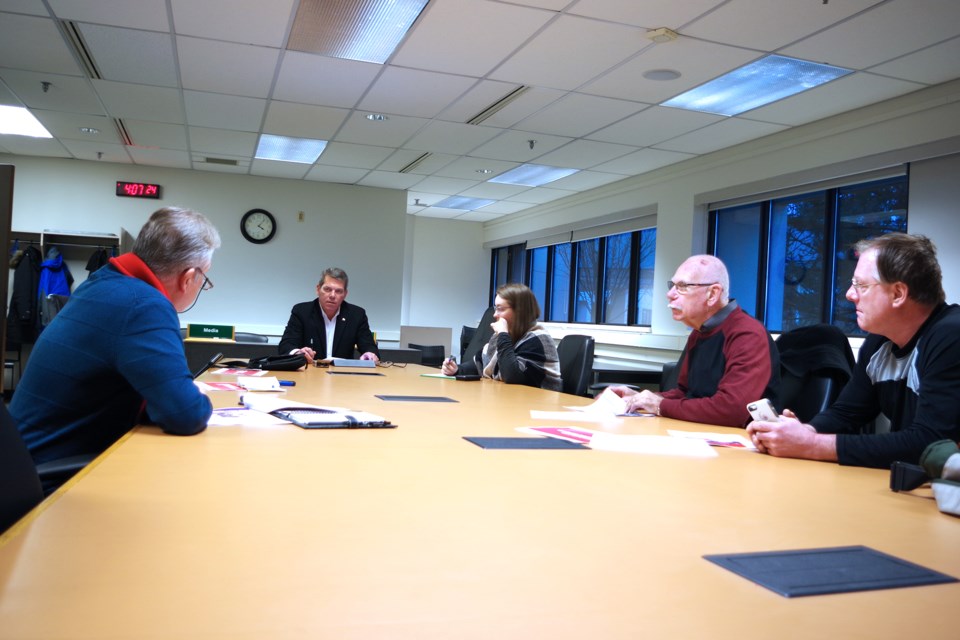Niagara Centre MP Vance Badawey held a pre-budget consultation yesterday for Thorold residents and officials.
The idea is to gain input from city council and the public to identify the projects Thorold would like to see supported in the federal budget.
A small turnout attended the regional offices for a round-table session.
Badawey has spearheaded the establishment of a trade corridor between Niagara and Hamilton and moving the mid-peninsula corridor forward. Those will remain broader priorities, but the round table was aimed at local needs.
Badawey said he’s received about 98 per cent of the federal funds he has asked for amounting to about $330 million for Niagara over the past two years.
“They haven’t really said no to me because most of the things we do make sense,” he argued.
He added that one of his goals is to get items for Niagara put into the line items of the budget rather than relying exclusively on existing funding envelopes to meet the riding needs. He also urged integrated requests involving municipalities, the Region and the Province to present shared needs and priorities such as inter-regional transit.
Among the agenda items Badawey presented were:
- Ways to improve the quality of the middle class,
- Ensuring a healthy and secure retirement,
- Dealing with the high cost of living,
- Ways of business and individuals to respond to the changing economy,
- Better health and mental care and affordable prescription drugs.
The floor was open for discussion and other topics and projects were welcomed.
Mayor Terry Ugulini and councillor Fred Neale were in attendance and one of the things the city would like to see is some additional funding for a new operations centre in Thorold.
Badawey encouraged individual submissions to determine if patterns emerge pointing to items residents feel are most pressing.
Neale suggested that affordable seniors and social housing was a primary concern in Thorold.
“Long term care and transportation for seniors, is very important,” he said.
Badawey said that capital investment is the input from the federal government, but the Region and province must allocate the funds as they see fit. But, he pointed out, this is where public input can help ensure those funds are used to maximum effect.
“If I get input from all 12 municipalities in the Region I’m more than likely to get that capital funding,” he said.
Thorold Community Activities Group Executive Director Dan Pelletier noted that clarification of what’s happening with transportation, especially the GO-Train would be helpful as conflicting reports on progress and deadlines keep emerging.
Badawey agreed that transportation in Niagara and between the Region and Toronto must be improved as the tourism industries across the Region have stated that transportation is the biggest challenge to them.
Turning to pension security, he said legislation is also needed to make sure those funds aren't touched. "Corporations should not be allowed to unfund the liability," he argued.
Mayor Ugulini noted that caps on contributions must be raised so that during good times a surplus can be built to offset deficits in bad times which result in pension fund shortages.
"And if a company goes bankrupt, the pecking order should see pensions at the top of the list," he added.
Next, the MP pointed out that Dr. Eric Hoskins will chair a federal government advisory council with a goal of creating a national pharmacare plan. "We are awaiting recommendations on that," he said.
Among the other topics discussed were increasing, through a built-in mechanism, Canada Pension Plans to keep up with rising costs.
Badawey also stated "I don't buy that there are no jobs. A lot of sectors have come to me looking for workers. There is a shortage in the shipping industry. I'm constantly hearing about jobs not being filled."
He agreed that sometimes transportation costs and low wages are sometimes factors in discouraging availability of workers.
A discussion occurred around the table focusing on the need for constant training for workers. All agreed that mobility of workers is necessary and skill upgrades and targeting areas to provide funding for training in sectors where there is the greatest need.
Ugulini said that public/public partnerships need to be improved to provide training for the skill sets that are needed. "We might put money into it today but down the road it will cost you less because we will have people who are employed," he stated.
"The big thing that's going to change is that lifelong learning is important. Technology is changing so fast that skills sets will change over time," he added.
"That's where you need businesses to work with universities and colleges to make sure that they constantly evolve," he said.
Badawey pointed to the shortage of caregivers and the increase in young people becoming caregivers to parent, seniors and dementia victims as an area that needs more workers.
Touching on the current rift between the federal and provincial governments regarding pollution controls, Badawey said educating the public is needed.
The Ford government has vowed to fight the carbon tax, but Badawey supported the federal stance and argued against that. He said the costs attached to pollution are already there but are being shouldered by the taxpayer.
"Right now the carbon tax is being paid for by the property owner," he argued.
"We're trying to get it (the costs) onto the polluters," he said.
In conclusion he said, "The policies come from people. We will bring forward ideas based on what we hear."
He urged the public to continue providing input through an online survey and email.
Thorold residents are encouraged to email: [email protected] or directly through Badawey's office at: [email protected] or through an online questionnaire here.



